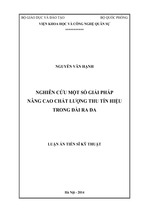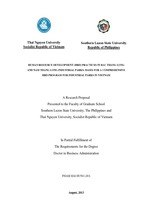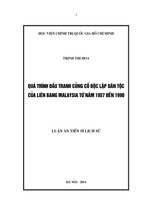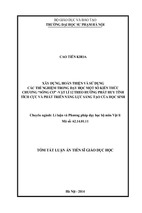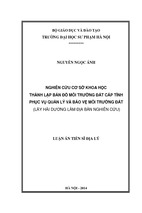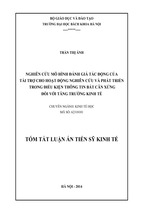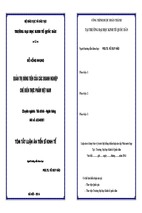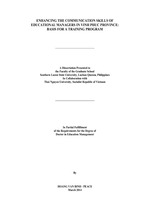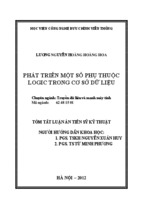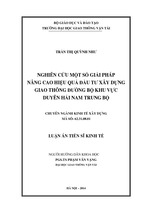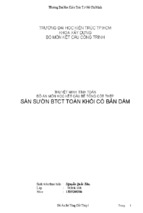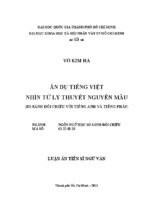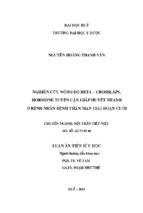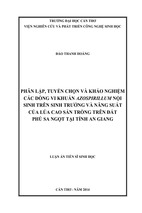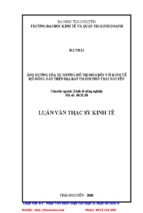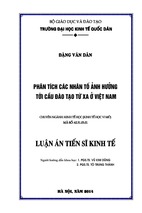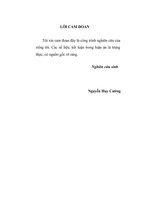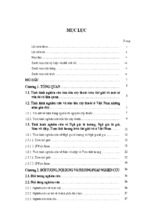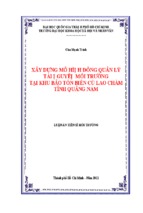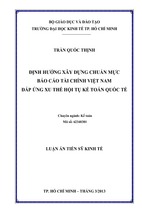i
i
THAI NGUYEN UNIVERSITY
Socialist Republic of Vietnam
BATANGAS STATE UNIVERSITY
Republic of the Philippines
PROPOSED TRAINING MODULE FOR ENHANCING TEACHERS‟
MOTIVATIONAL TECHNIQUES AND STUDENTS‟ PERFORMANCE
IN BASIC ENGLISH COURSE IN HANOI UNIVERSITY
OF INDUSTRY (HaUI)
A Dissertation
Presented to
The Faculty of Graduate School
Batangas State University
Batangas City, Philippines
In Partial Fulfillment
Of the Requirements for the Degree
Doctor of Philosophy
major in English
By:
BUI THI NGAN
June 2014
ii
THAI NGUYEN UNIVERSITY
Socialist Republic of Vietnam
BATANGAS STATE UNIVERSITY
Republic of the Philippines
ABSTRACT
Title
Proposed
a
training
module
for
enhancing
teachers’
motivational techniques and students’ performance in Basic
English Course in Hanoi University of Industry
Author
: Bui Thi Ngan
Course
:Doctor of Philosophy major in English language and Literature.
Year
: 2014
Adviser
: Dr. Maltida H. Dimaano
Summary
This study aimed to determine the relationship of teachers’ motivational
techniques and students’ academic performance in Basic English Course and its
implication to language teaching and learning in Hanoi University of Industry in
order to come up with a proposed training module for enhancing teachers’
motivational techniques and students’ performance.
This study made use of descriptive method of research to determine the
relationship of teachers’ motivational techniques and students’ performance in
Basic English course and its implication to English Language teaching and
learning in Hanoi University of Industry. A descriptive-correlational method will
be the most appropriate
method for this study because it will attempt to
determine how related two or more variables are. Gay, L. R. (1987).
iii
THAI NGUYEN UNIVERSITY
Socialist Republic of Vietnam
BATANGAS STATE UNIVERSITY
Republic of the Philippines
The two research instruments: Survey Questionnaire and Teacher Madetest were utilized in gathering data. The data gathered were subjected to the
following statistical treatment to have a meaningful interpretation and analysis of
the study: Cronbach alpha, Frequency Count, Mean, Percentage, Ranking,
Standard Deviation and T-test.
The findings of the study revealed that the teacher respondents were
young with ages ranging from 22 to 38 years old; most of them are female and
come from Ha Noi; all or 100 percent of them are married with Bachelor’s
degree with 1 to 5 years of teaching experience. The three motivational
techniques used consistently by Vietnamese teacher are (2) promoting learners.
self-confidence, (8) making the learning tasks stimulating, and (9) promoting
learner autonomy. The level of test performance of student respondents of Hanoi
University of Industry in Basic English Course indicate low performance of
students in all test areas. There is not much relationship that exists between the
teachers’ motivational techniques and students’ performance in English. The
proposed training module consists of learning activities or strategies with
corresponding motivational techniques geared toward improving teaching Basic
English.
iv
THAI NGUYEN UNIVERSITY
Socialist Republic of Vietnam
BATANGAS STATE UNIVERSITY
Republic of the Philippines
ACKNOWLEDGEMENT
This dissertation wouldn’t have been possible had it not been for the
support, love, patience, and generosity of many people, who have helped me in
their own incredible way to deal with myself while trying to find my voice in
what I do.
First of all, I would like to acknowledge and express my deep gratitude to
my supervisor, Dr. Maltida H. Dimaano, for her greatly enthusiastic guidance,
encouragement, and constructive comments in-depth along the way with my
project. Without her support, this dissertation would not be able to be completed
properly.
My appreciation is also spared for quite a number of the professors
including in particular Dr. Corazon Cabrera. Dr. Remedios P. Magnaye, Dr
Amada G. Banaag, Dr. Maria Luisa A. Valdez, … who have provided me with
profound knowledge in the field of the study, and to those lecturers, colleagues
and friends who have given great help, advice and criticism on the dissertation
for the improvement in significant ways.
My sincere thanks go to all the members of the ITC, Thai Nguyen
University for their constant assistance while my work was in process
I am also indebted to our University Rector - Dr, Tran Duc Quy, who has
always given me a lot of encouragement and all the students and my colleagues
at Hanoi University of Industry for their help as participants in the gathering of
evaluation data and developing the project.
Finally, the deep love, encouragement and support from all the members of
my family would be highly appreciated and
my greatest thanks go to my
husband and my two children for giving me life, love, values, and belief that I
can accomplish anything I set out to do. All I have ever wanted was to make you
proud of me! Thank you.
v
THAI NGUYEN UNIVERSITY
Socialist Republic of Vietnam
BATANGAS STATE UNIVERSITY
Republic of the Philippines
TABLE OF CONTENTS
Page
TITLE PAGE ............................................................................................... i
TABLE OF CONTENTS ............................................................................ v
LIST OF TABLES .................................................................................... viii
LIST OF FIGURES ....................................................................................ix
CHAPTER
I. THE PROBLEM
Introduction ............................................................................ 1
Statement of the Problem ................................................... 10
Scope, Delimitation and Limitation of the Study .................. 11
Significance of the Study ..................................................... 12
II. REVIEW OF LITERATURE
Conceptual Literature .......................................................... 14
Research Literature ............................................................. 58
Synthesis ............................................................................ 70
Theoretical Framework ........................................................ 74
Conceptual Framework ........................................................ 79
Hypothesis ........................................................................... 81
Definition of Terms ............................................................... 81
III. RESEARCH METHOD AND PROCEDURE
Research Design ................................................................. 84
vi
THAI NGUYEN UNIVERSITY
Socialist Republic of Vietnam
BATANGAS STATE UNIVERSITY
Republic of the Philippines
Research Environment ........................................................ 83
Subjects of the Study ........................................................... 84
Data Gathering Instrument .................................................. 86
Data Gathering Procedure ................................................... 86
Statistical Treatment of Data ............................................... 88
IV. PRESENTATION, ANALYSIS AND INTERPRETATION OF
DATA ................................................................................... 91
Developed training module for teachers ............................ 135
V. SUMMARY, CONCLUSION AND RECOMMENDATION
Summary ........................................................................... 190
Findings ............................................................................. 191
Conclusions ....................................................................... 197
Recommendations ............................................................. 197
BIBLIOGRAPHY ................................................................................... 199
APPENDICES
A. Questionnaire for Teachers ................................................... 206
B. Questionnaire for Students .................................................... 215
C. Validation Letter of Questionnaire for Teachers .................... 222
D. Validation Letter of Questionnaire for Students ..................... 223
E. Letter of Request to the Head of HaUI................................... 225
F. Response Letter of the Head of HaUI .................................... 226
G. Photograph of HaUI, the study site ........................................ 227
vii
THAI NGUYEN UNIVERSITY
Socialist Republic of Vietnam
BATANGAS STATE UNIVERSITY
Republic of the Philippines
H. Documents for validation of questionnaires in Batangas State
University ................................................................................ 228
I.
Documents for Administration of Questionnaires in Hanoi
University of Industry (HaUI) ................................................... 229
J. Documents for response Letter of the Head of HaUI validation
of questionnaires ................................................................... 230
CURRICULUM VITAE ........................................................................... 231
viii
THAI NGUYEN UNIVERSITY
Socialist Republic of Vietnam
BATANGAS STATE UNIVERSITY
Republic of the Philippines
LIST OF TABLES
Table
Page
1. Distribution of respondents of Hanoi University of Industry (HaUI) ... 86
2. Age Profile of Teacher Respondents .................................................. 92
3. Gender Profile of Teacher Respondents ............................................ 92
4. Place of Origin Profile of Teacher Respondents ................................ 93
5. Civil Status Profile of Teacher Respondents ...................................... 95
6. Educational Classification Profile of Teacher Respondents ............... 95
7. Years of Teaching Experience Profile ................................................ 96
8. List of 48 motivational techniques validated. ..................................... 98
9. List of 48 motivational techniques, their frequency ........................... 104
10.List of 48 motivational techniques, degree of importance ................ 111
11.Performance of student respondents in a teacher-made test........... 116
12.Student's t-test comparison of the mean % scores .......................... 117
13.T-test comparison of the mean scores for frequency ....................... 119
14.List of motivational techniques, their macro-strategy grouping, Cronbach
alpha values, significant relationship on three areas of Basic English ......123
ix
THAI NGUYEN UNIVERSITY
Socialist Republic of Vietnam
BATANGAS STATE UNIVERSITY
Republic of the Philippines
LIST OF FIGURES
Figure
Page
1. Research Paradigm ............................................................................. 80
1
1
THAI NGUYEN UNIVERSITY
Socialist Republic of Vietnam
BATANGAS STATE UNIVERSITY
Republic of the Philippines
CHAPTER I
THE PROBLEM
Introduction
English as the number one foreign language in Vietnam is a
product of the Doi Moi or Renovation initiated by the Vietnam Communist
Party in 1986. As an overall economic plan, Renovation opens its door to
the whole world through its policy making English as the only foreign
language to be taught in Vietnam. Vietnamese students have to pass an
English language test being one of their six national examinations for
them
to
get
the
certification
for
Secondary
school
education.
Undergraduates and graduates of tertiary level are required to take
English as a subject.
Teaching English in various places at all levels expanding
educational system in Vietnam is part of the mounting pressures where
knowledge and ability to learn and communicate in English is a must and
of importance. In Vietnam, there is low standard in teaching English and
its use and without major changes and sizable inputs in curricula or
course, methodology and materials, English teaching in Vietnam would
soon cease to serve the demands being made on it (HongVan,httpPrimeEducationConsultancy12/29/13).
Further, In Vietnam, Decision No. 1400/QDTTg approving the 10year National Plan for “Teaching and Learning Foreign Language in the
National Formal Educational System in the Period of 2008-2020” was
2
THAI NGUYEN UNIVERSITY
Socialist Republic of Vietnam
issued on Sept. 30, 2008.
BATANGAS STATE UNIVERSITY
Republic of the Philippines
This decision covered the three phases.
Phase one gives priority to developing and perfecting the ten year foreign
language curriculum which focus on English writing, foreign textbooks,
preparing necessary condition for exercising the ten-year foreign
language (English) program. Phase two on the other hand gives focus on
introducing the ten year foreign language program throughout the whole
general educational program and phase three centers on perfecting the
ten-year foreign language program throughout the whole general
educational system and on developing intensive foreign language
program for vocational schools, colleges and universities.
Clearly, it is expected that by year 2020, most Vietnamese students
who will graduate from secondary, vocational schools, colleges and
universities will be able to communicate in English language confidently in
their daily conversation, in their study and their work in an integrated,
multi-cultural and multi lingual environment as well as making foreign
language a comparative advantage of development for Vietnamese
people in the course of the country‟s industrialization and modernization.
In addition, in the general education level in Vietnam, the mandate
of English language teaching (ELT) introduced by the Ministry of
Education and Training in 2007 include ability of secondary students to
use English as a means of communication at certain level of proficiency
in the four macro skills and be able to read materials fitted for their levels;
master basic English phonetics and grammar and acquire vocabulary in
3
THAI NGUYEN UNIVERSITY
Socialist Republic of Vietnam
BATANGAS STATE UNIVERSITY
Republic of the Philippines
English; as well as attain certain level of understanding of English and
American
culture
and
develop
awareness
on
the
cross-cultural
differences for students to become better communicator, to inform the
world regarding the history and culture of the Vietnamese people and to
take pride of the Vietnamese language and culture.
But based on the EF English Proficiency Index (EP EPI), Vietnam
has 44.32 percent or very low English proficiency close to Thailand with
39.41 percent. This index – the first of its kind is used to compare the
English proficiency of non-native English speaking countries, calculated
from 2,360,730 test takers in 42 countries and two territories from 2007 to
2009. In 2012, Vietnam showed an EPI of 52.14 percent or low
proficiency, an improvement from the previous year in comparison with
Thailand wherein got a value of 44.36 or very low English proficiency.
So that motivation in English language learning is considered or
looked into as it plays an important role in both teaching and learning. It
is also one of the main determinants of second or foreign language
learning achievement. Motivation as a direct determinant of second
language achievement is also one of the individual variables where more
attention and direction should be given. It is also considered a stable
learner trait and can be analyzed based on the aspect of the language
learning process associated with the classroom.
Motivation as a global concept and one of the most effective factors
in all kinds of educational settings is also one condition where learners
4
THAI NGUYEN UNIVERSITY
Socialist Republic of Vietnam
BATANGAS STATE UNIVERSITY
Republic of the Philippines
are willing to invest their time and efforts in order to learn. It is a personal
character where some learners may have it while others don‟t. Basic
motivational drives varied from each individual at different times and
should be situational. Motivation is also requested with the desire and
drive within the individual for him to achieve his goal so that as an internal
condition it is dependent on his needs and perception. Involve also in
motivation is the willingness of the person to exert high levels of effort for
a certain kind of goal to satisfy some individual needs.
As a process of arousing, directing and maintaining behavior
toward a goal, motivation indicates also for a person to have vigor in
order for him to produce better output. A well- motivated person must
have a very clear well - defined goals for him to take actions where he
expects attaining such goal with success. Strengths and directions of
behaviors are also some concerns of motivations.
If a person has
behavioral commitment he can be very effective at work.
Certain
behaviors such as being purposive, designated, and goal oriented
involved certain forces acting within the individual for him to initiate,
sustain and direct such kind of behaviors.
Comprising part of teacher‟s pedagogical knowledge is a
combination of many different aspects called motivation. It is impossible
to maintain and be successful with the techniques at all times and
teachers must have this realization. Teachers will be feeling better about
his quality of teaching if he gains experience using some of the
5
THAI NGUYEN UNIVERSITY
Socialist Republic of Vietnam
techniques.
BATANGAS STATE UNIVERSITY
Republic of the Philippines
Teachers must realize that teacher‟s ability to create the
quality is the basis for the quality learning experience.
The problem of motivating students cannot be done in one simple
process. In motivating students‟ to learn, individual style and personality
of the teacher is of utmost importance for it plays a significant role in the
implementation of motivation strategies. A wide variety of learning
experiences for the student is involved and the structure of class period is
also dependent on motivation routine. So that it is important for teachers
to have familiarity on the different types of motivation and its role in
teaching.
The personality of the teacher is one of the aspects of motivation
that is hardest to change. One of the most demanding environments
where teachers‟ perceive behaviors of learner‟s self-worth is that of
classroom environment. The characteristic necessary to motivate a class
as part of a teacher‟s task in the classroom which is always done in a
careful daily process often meet some failures and needs.
There are several perceived teachers‟ characteristics considered
important for students‟ motivation to learn. A teacher must possess a
concern and caring attitude towards students, as well as love and
knowledge and utilize them for accomplishing something. There
is a
meaningful effect on students‟ performance and behavior based on their
perceptions regarding teacher‟s concern and care for them.
Students
tend to be high achiever in their academic performance upon perceiving
6
THAI NGUYEN UNIVERSITY
Socialist Republic of Vietnam
BATANGAS STATE UNIVERSITY
Republic of the Philippines
that their teachers are willing to reach them out and provide necessary
assistance even if students are aware that teacher maintains the same
standards.
Although some students considered love and care to be the most
important characteristics they are expecting for a teacher to manifest,
they also consider humor and high expectations as other characteristics
their teachers should possess. Humor can stimulate, illustrate, motivate
and lose tension that‟s why it is considered a valuable character trait a
teacher should have.
In the classroom, motivation did not receive much scholarly
attention until recently that teachers tend to rely on unsystematic bag-oftricks approaches or on some theories.
Students in the classroom want to use their teachers as human
beings having warm and genuine sense of humor. These character traits
can reveal teacher‟s humanness, comfortableness and secured attitudes
in terms of their course materials and knowledge as well as their personal
relationship with students.
Teachers who motivate students in class have high expectations of
them. Students‟ performance is affected by a high expectation of the
teacher which is communicated to them through different kinds of cues,
either verbal or non- verbal. Student on the other hand even if he has
negative expectation about the teacher is still affected by the high
expectation of the teacher on him. Teacher should identify the standards
7
THAI NGUYEN UNIVERSITY
Socialist Republic of Vietnam
BATANGAS STATE UNIVERSITY
Republic of the Philippines
of quality through a solid motivational routine. Once this quality is clearly
explained in terms of its attainment to the students, they will work hard to
achieve and maintain it. Teachers determine the standards of quality for
students to achieve.
If the standards set by the teacher is clearly
explained and identified in terms of specified ways of achieving them,
more success in meeting high expectations will be done by the students.
In motivating students, their desire to learn can be elicited by
teachers through a variety of teaching techniques aside from
teacher‟s personality. The interaction between the lesson structure
and teacher‟s personality serve as bases of learning experience.
Teachers are expected to be comfortable to the techniques they are
using in the classroom. Teacher who is uneasy and not comfortable
in his teaching even if he has a very long number of years of
teaching experience as well as other causes will convey the same
uneasiness to his students. Only teachers sincerity, concern, humor
and increase expectations can decrease students‟ restlessness
albeit motivate students to learn more easily.
Interaction and worthwhile tasks can be used to motivate students
as well as the environment in which students learn. Interaction between
the teacher and the students are also important in any learning
experiences. Teaching is considered interaction that facilitates learning.
Teachers‟ can‟t interact with their students sometimes because they don‟t
have respect for students. Teachers treat their students alike and in the
8
THAI NGUYEN UNIVERSITY
Socialist Republic of Vietnam
BATANGAS STATE UNIVERSITY
Republic of the Philippines
same way. The interaction that is nurtured between the students and the
teacher are interrupted because of that attitude. Teacher has to accept
individual differences and once there is acceptance of students
differences, the door to interaction is opened. Knowledge and skills
reacquired by students quality of learning is improved regardless of the
kind of lifestyles students have through active participation process
because they are highly motivated.
One factor identified that creates distance between the teacher and
the student is the interest of the teacher which differs from the interest of
the students. Teachers who teach students without taking initiatives to
learn more above the interests of students are losing a great motivational
technique. Learning about students‟ lives is a great challenge for many
teachers, but it is very important for the teacher to have an impact on their
students‟ lives.
In teaching, there are many techniques that are found to be
motivational like cooperative learning. Teacher feeling comfortable with
the implementation of the said technique is an important aspect of any
teaching techniques since the desired outcome of any motivational
technique is for the students to participate in class. In motivating students,
it is considered essential that teachers must show concerns in taking time
to find the techniques that best fit the class thereby allowing teachers to
feel comfortable and professional.
9
THAI NGUYEN UNIVERSITY
Socialist Republic of Vietnam
BATANGAS STATE UNIVERSITY
Republic of the Philippines
Quality atmosphere for learning in the classroom can be
considered a motivational factor that contributes effective teaching. It is
of importance to look for some aspect of this atmosphere since classroom
is a place where motivation can be facilitated. One area that can greatly
affect the classroom is routine. Students know what to expect through the
use of routine and it can establish a good comfortable atmosphere of
learning. It is a must to prevent the use of routine to become boring and
mundane on the part of the students‟ inclusion of motivational technique.
Student‟s
discipline
is
considered
inevitable
in
any
classroom
environment aside from classroom routine and the development of
student‟s success. Teachers must maintain effective discipline to motivate
students who are task to act responsibly and to show good human
relations because of its effects in learning.
As regard to English classes observed, students lack interest in
learning this foreign language because Vietnam English is not considered
the core subject in the curriculum. Most Vietnamese students focus their
studies on natural science subject. The prescribed English textbooks
containing complex topics and lessons attributed also to students‟
difficulty and discouragement in learning English. Classes in Vietnam also
comprised of forty five to fifty students per class. These language classes
have also an effect on the English language activities of students that
demand group or pair work. Students‟ learning is also affected by the
many holidays in Vietnam and for the entire school year. These
10
THAI NGUYEN UNIVERSITY
Socialist Republic of Vietnam
BATANGAS STATE UNIVERSITY
Republic of the Philippines
interruptions of classes contributed to the poor learning attitude of
students aside from poor equipment, outdated teaching materials,
inadequately trained teachers and written grammar focused government
examinations.
Though teachers use motivational techniques in teaching, they still
use the traditional methods of teaching, such as giving assignments,
compiling of vocabulary tests, teaching grammar with the use of visual
aids, engage students in various language activities and control their
class by teaching and explaining lessons all the time.
It is more of
teacher centered rather than students. Teachers did not give their
students opportunities to engage in group or pair works to share
information inside the classroom.
As an administrator of Hanoi University of Industry, I am interested
in investigating the relationship of teachers‟ motivational techniques and
students‟ English performance. Finding out the patterns of the varied
techniques utilized by teachers as well as knowing the academic
performance of students in English Basic Course will serve as basis for
developing a training program that will address the concerns relative to
the study.
Statement of the Problem
This study determined the relationship of teachers‟ motivational
techniques and students‟ academic performance in Basic English Course
and its implication to English Language teaching and learning in Hanoi
11
THAI NGUYEN UNIVERSITY
Socialist Republic of Vietnam
BATANGAS STATE UNIVERSITY
Republic of the Philippines
University of Industry in order to come up with a proposed training module
for
enhancing
teachers‟
motivational
techniques
and
students‟
performance in Basic English Course
Specifically, it seeks to answer the following questions:
1. What is the demographic profile of the teachers in terms of:
1.1 Age
1.2 Gender
1.3 Place of origin
1.4 Civil status
1.5 Educational qualification
1.6 Years of teaching experience?
2. What are the motivational techniques employed in teaching the
Basic English course?
3. What are the levels of students‟ performance in Basic English
test?
4. Are there significant relationships between teachers‟ motivational
techniques and students‟ performance in English?
5. What training module may be proposed to enhance student‟s
performance?
Scope, Delimitation and Limitation of the Study
The study covered the motivational techniques used by teachers in
teaching Basic English course. The demographic profile of the teachers
was used consisting of information like age, gender, place of origin and
- Xem thêm -


